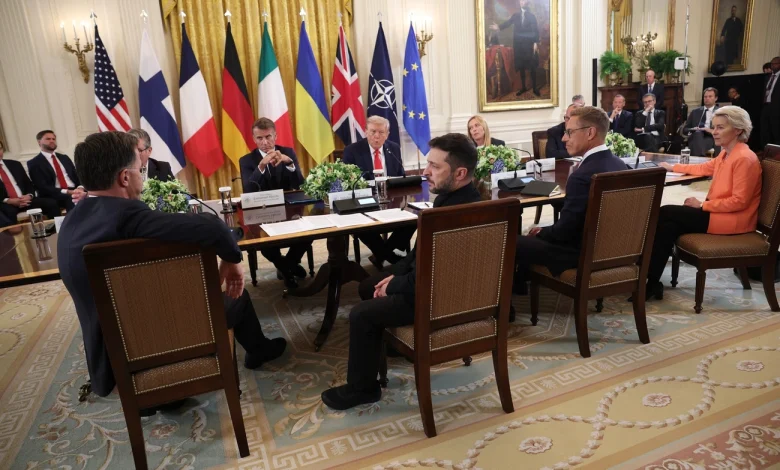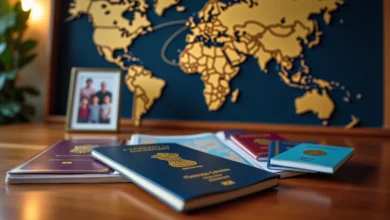
Putin, Trump Accuse European Leaders of Derailing Peace Talks
Trump and Putin blame European leaders for the stalled Ukraine peace efforts despite recent diplomatic initiatives. Russian forces launched their second-largest aerial assault of the war last Thursday. The attack unleashed 629 drones and missiles at Kyiv that killed 23 people. This massive strike has made negotiations between the warring parties even more challenging.
The conflict’s economic impact continues to evolve substantially. European oil imports from Russia dropped to $1.72 billion in 2025’s first quarter, compared to $16.4 billion in the same period of 2021. Russia earned €1.1 billion from fuel sales to the EU in the last year. The situation between Putin and Zelensky remains tense, but French President Macron revealed a potential diplomatic breakthrough. He announced that 26 countries support security guarantees for Ukraine “in different formats”. Peace talks show no progress as Trump and Putin increasingly criticize European leaders. They claim these leaders are blocking what could be a quick end to the conflict.
Trump and Putin blame Europe for stalled Ukraine peace talks
Image Source: Reuters
Peace negotiations have hit a wall. American and Russian leaders now blame European nations for blocking progress. They point to Europe’s economic connections with Russia and claim Europeans spread fear about Russian motives.
Trump criticizes EU oil purchases from Russia
President Donald Trump has taken a tough position against European allies about their ongoing energy deals with Moscow. Trump told European leaders at the “Coalition of the Willing” meeting that Europe must stop buying Russian oil that funds the war in Ukraine. Russia’s fuel sales to the EU reached €1.1 billion ($1.30 billion) over one year, according to White House data.
“The President also emphasized that European leaders must place economic pressure on China for funding Russia’s war efforts,” a White House official stated. European countries stopped importing Russian crude in 2022 and Russian fuel in 2023. However, Hungary and Slovakia still buy Russian oil under EU exemptions.
Putin accuses Europe of spreading war hysteria
Russian President Vladimir Putin has launched his own attacks against European leaders. Putin met with Slovakian Prime Minister Robert Fico in Beijing and called NATO countries “horror movie makers” who make up threats about Russia’s plans.
“They keep fanning hysteria about Russia allegedly planning to attack Europe. I think that for anyone in his right mind this looks like a clear provocation or evidence of utter incompetence,” Putin declared. France’s health ministry recently told hospitals to prepare for a possible “major engagement” by March 2026. Germany’s defense chief also warned about upcoming Russian military drills.
White House officials echo frustration with European allies
Trump’s administration has grown tired of European partners. Senior White House officials believe Europe undermines Trump’s peace efforts by pushing Ukrainian President Volodymyr Zelensky to demand unrealistic terms.
“Getting to a deal is an art of the possible,” a top official told Axios. “But some of the Europeans continue to operate in a fairy-tale land that ignores the fact it takes two to tango”. The administration has asked the Treasury Department to list potential sanctions that Europe could impose on Russia.
A White House source put it bluntly: “If Europe wants to escalate this war, that will be up to them. But they will be hopelessly snatching defeat from the jaws of victory”.
How European leaders respond to the accusations
Image Source: France 24
European leaders have coordinated their response to Trump and Putin’s accusations. They stand firm on Ukraine’s security and defend their diplomatic strategy.
France and Germany push for security guarantees
Trump and Putin’s summit prompted France and Germany to release a joint statement. “Despite intensive international diplomatic efforts, Russia shows no intention to end its war of aggression against Ukraine”. Both countries promised Ukraine more air defense support after their leaders met in southern France. German Chancellor Friedrich Merz emphasized that a ceasefire summit with Zelensky must come first, followed by “strong security guarantees”. Emmanuel Macron, the French President, set a Monday deadline for Putin to join peace talks with Zelensky. He warned that missing this deadline would prove Putin “has played President Trump”.
European officials deny undermining peace efforts
European officials strongly rejected the White House’s criticism about their peace negotiation approach. A senior European diplomat confirmed to reporters their public and private stances on Ukraine matched perfectly. The EU has already started preparing new sanctions against Russia. The EU Council welcomed Trump’s efforts to end Russia’s war in their statement. They stressed that “a just and lasting peace for Ukraine must respect international law” and “the path to peace in Ukraine cannot be decided without Ukraine”.
Macron announces 26-nation support for Ukraine
Macron revealed at a Paris summit on September 4 that 26 countries would provide postwar security guarantees to Ukraine. This “reassurance force” would respond immediately after any ceasefire “by land, sea or air”. These forces “would not be deployed on the front line” but would work to “prevent any new major aggression”. Zelensky called this commitment “the first such serious concrete step” toward securing Ukraine’s future. Macron mentioned that US support for these security guarantees would be finalized “in the coming days”.
Why the Putin-Zelensky meeting remains elusive
Image Source: Council on Foreign Relations
Diplomatic efforts to coordinate a face-to-face meeting between the warring presidents have hit roadblocks. The main issues revolve around location and preconditions.
Putin invites Zelensky to Moscow under ‘security guarantees’
Russian President Putin announced Moscow stands “ready” to host peace talks with Ukraine. He promised to provide full security guarantees for Ukrainian delegates. Putin’s speech at the Eastern Economic Forum emphasized, “We will definitely provide the conditions for work and security, 100% guarantee”. The idea of meeting in a third country seemed excessive to him, and he insisted Moscow was the only viable option.
Ukraine rejects venue as unsafe and symbolic
Zelensky’s response was swift and clear. “If you want the meeting not to happen, you should invite me to Moscow”. Ukraine’s Foreign Minister Andrii Sybiha called the invitation “unacceptable”. Ukraine suggested several neutral locations:
- Switzerland, Austria, or Turkey
- The Vatican or Saudi Arabia
- Any of “seven countries” ready to host talks
Trump’s changing deadlines and lack of follow-through
Trump ignored his latest deadline for Putin to negotiate with Zelensky. His original prediction claimed a meeting would happen within two weeks. In spite of that, as deadlines passed, Trump began comparing the leaders to “oil and vinegar”. He relied on his “personal chemistry with Putin” but never followed through on threats of “consequences” when progress stalled.
What security guarantees are being proposed
Image Source: ABC News – The Walt Disney Company
Security proposals for Ukraine have become a crucial sticking point in peace negotiations. Western allies and Moscow cannot agree on their visions for the war-torn nation’s future.
US and EU think about NATO-style commitments
Special US Envoy Steve Witkoff claimed Putin agreed to allow “Article 5-like protection” for Ukraine during the Alaska summit and called this “game-changing”. This approach mirrors NATO’s collective defense principle where member nations treat an attack on one as an attack on all. Italian Prime Minister Giorgia Meloni suggested individual Western powers should promise to defend Ukraine from future attacks. The 2022 Istanbul framework presents a different model – Ukraine would give up NATO ambitions in exchange for security assurances from the US, Russia, China, Britain and France.
Peacekeeping force discussed at Paris summit
Macron announced at the Paris summit that 26 nations pledged postwar security guarantees. These include an international “reassurance force” operating on land, sea and in air. The forces would stay away from front lines to prevent future Russian aggression. The plan has a “demonstration” element with troops at strategic locations and a “regeneration” component. This would rebuild Ukraine’s military into what EU leaders call a “steel porcupine”. France’s army chief General Thierry Burkhard explained these guarantees would likely need “deploying troops to Ukraine, flying aircraft over Ukrainian territory, ensuring shipping in the Black Sea and helping rebuild the Ukrainian army”.
Russia rejects foreign troop presence in Ukraine
Putin strongly rejected all Western security proposals. He warned that Russia’s military would treat any foreign troops in Ukraine as “legitimate targets”. Kremlin spokesperson Peskov claimed, “Can Ukraine’s security guarantees be ensured by foreign military contingents? Definitely not”. Foreign Ministry spokeswoman Maria Zakharova dismissed discussing “fundamentally unacceptable” foreign intervention “in any form, in any format”. NATO Secretary General Mark Rutte responded to these objections: “Why are we interested in what Russia thinks about troops in Ukraine? It’s a sovereign country”.
Diplomatic efforts to resolve the Ukraine conflict have hit a wall of mutual accusations and deep disagreements. Trump and Putin now line up in their criticism of European leaders, though they each have different reasons. European officials refuse to budge from their stance that any peace deal must protect Ukraine’s sovereignty and follow international law.
The biggest problem blocking real progress remains security guarantees. European plans for peacekeeping forces clash with Russia’s strict limits against foreign troops in Ukraine. Macron recently announced that 26 nations now support security guarantees for Ukraine – a big step forward that Moscow strongly opposes.
Putin asked Zelensky to meet in Moscow, but this seems like an offer meant to be rejected given Ukraine’s valid security worries. Trump keeps moving deadlines and making empty promises, which shows the peace process lacks real drive despite what leaders say in public.
Peace now depends on whether these leaders can bridge their very different ideas about Ukraine’s future. European leaders support strong security guarantees that Russia won’t accept. Trump seems stuck between wanting a diplomatic win and putting real pressure on Putin. Ukraine faces tough choices between fighting for its territory and accepting compromises to end the fighting.
The conflict will likely drag on whatever diplomatic moves are made, unless these deep differences get fixed. Russian air attacks keep getting worse while talks go nowhere. This paints a dark picture ahead. The war in Ukraine remains a humanitarian disaster that tests international diplomacy’s strength and determination.






